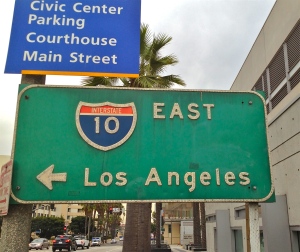Teacher Evaluation as Legal, Political Football
[EDIT: 12/5/12 - also see Lisa Alva's comment below regarding UTLA vote]
Los Angeles Unified School District and United Teachers of Los Angeles have reached a tentative agreement on new teacher evaluation practices and policies. The union will take up the agreement in a meeting of its governing body later today, and I expect that there will be some tough questions for the union leadership regarding compromises on the use of student testing results. A legal ruling against the district held that, under current law, student growth had to be a factor in teacher evaluation. That may be the law, but it still doesn’t make sense from an educational measurement or research standpoint. Judges, lawyers, and legislators cannot change the facts, even though they can ignore them: tests designed and validated for the purpose of measuring student learning cannot be deemed valid for other purposes like teacher evaluation.
The favored approach in policy and politics these days – even though it doesn’t work – is to use “value-added” measures of student learning, trying to isolate the effect of a given teacher on each student. LAUSD has its own formula, called “academic growth over time” (AGT). Writing in EdSource Today, John Fensterwald summarized the agreement’s handling of AGT:
[LAUSD Superintendent] Deasy had proposed using it as a significant factor in evaluations; UTLA opposes it as unsound. In the agreement, AGT scores of individual teachers cannot be part of a teacher’s evaluation, although school-level AGT data, thought to be more reliable, can be included among many factors.
However, a more surprising development is that, apparently, students’ “raw” test scores will be factored into evaluation, as described by Chad Aldeman from EdSector:
Late last week the Los Angeles Unified School District and its teachers union (UTLA) reached an agreement on including student test scores in teacher evaluations. The agreement does not include all of the details (UTLA has posted a summary and the full provisions), but it is clear that they will not be using a teacher’s individual value-added score. Instead, they will be using school-level value-added data and a teacher’s raw performance data. Using raw performance data in a teacher’s evaluation is an incredible mistake, and one that both reformers and union leaders should loudly denounce.
The reason for alarm regarding that approach is that, even more than value-added formulas, this approach would distort or falsely attribute student performance to teachers. Standardized test scores track most closely to socio-economic status and English language acquisition, and students who excel or flounder in any given year are likely to produce similar results the following year. Under this approach, there’s an obvious penalty incurred by any teacher unlucky enough to teach students who are poor, or still learning English. What percentage of LAUSD teachers and students are we talking about here? A significant majority, I think.
Classroom observations will continue to be the more significant part of teacher evaluations, though LAUSD is still in the midst of working out new approaches to this component of evaluation. Lisa Alva Wood wrote about the 63-point rating system and the time involved in the process for her as a volunteer in the pilot-program for new evaluations. So, at the moment, it seems there’s nothing certain, nothing stable, when it comes to teacher evaluation in the state’s largest district.
Not surprisingly, teachers I’ve been in touch with in Los Angeles are not enthused about this agreement. Among multiple teachers I corresponded with, Jordan Henry, a leader in the NewTLA group within UTLA, took this view:
[The tentative agreement] basically slides the use and application of student data into Article X, which is the current evaluation protocol – the same protocol that has not been occurring inside LAUSD for decades. The plaintiffs in Doe/Deasy argued successfully that a flaw of the current evaluation system was the lack of student data – but those of us in LAUSD know and have known for some time that the dominant flaw of the evaluation system was the actual lack of observation/evaluation – and the joint planning before it, the joint discussion afterwards, all dictated in Article X. So for the time being, we’ve added a missing piece to a puzzle hardly used.
I don’t know how Los Angeles teachers will vote on this agreement, but I do know that, once again, education policies are being negotiated and debated under the wrong conditions. Rushed negotiations under threat of legal action, changing almost everything at once in procedures, neglecting the underlying lack of system capacity, and on the cusp of transitions to new Common Core standards and assessments – this is no way to improve education.
This blog post has been shared by permission from the author.
Readers wishing to comment on the content are encouraged to do so via the link to the original post.
Find the original post here:
The views expressed by the blogger are not necessarily those of NEPC.

